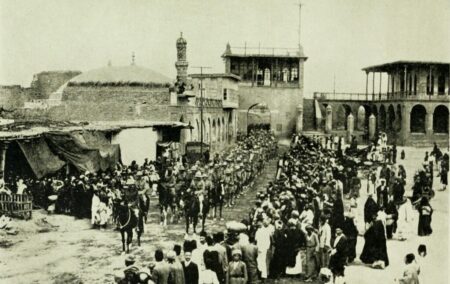This Week in History recalls memorable and decisive events and personalities of the past.
11th March 1917 – Fall of Baghdad to British Empire forces

When they think of the First World War, most people imagine the trenches of Flanders or perhaps the open steppe of Ukraine, Poland and Russia. But the reality is that the war had significant theatres outside Europe and was fought by many people who were not Europeans or Americans.
Indians, Arabs, Senegalese, Japanese, Nigerians, Kenyans and South Africans all fought in the conflict on the side of the allies in significant numbers and all achieved heroics and success at various points. Of course, one of the major powers on the side of Germany and Austria-Hungary was the Ottoman Empire, which at the turn of the 20th century ruled much of the Middle East. However, the Ottomans’ power had been waning for centuries at that point and many of the empire’s provinces were ready for rebellion.

The Ottoman Empire became involved in the First World War mostly due to the aggressive actions of the pro-German faction of the Ottoman government. The Pro-German faction, worried that the empire might side with the British, appears to have ordered recently purchased German warships still crewed by German sailors to carry out a surprise raid on Russian ports in the Black Sea.
This attack on the Russians by ships sailing under the Ottoman flag provoked a declaration of war by Russia and soon by its allies, Britain and France, on the Ottoman Empire in November 1914. The entry into the conflict of the Ottoman Empire would open a new front of the war in the Caucuses and north of the Arabian Peninsula, as British Arab allies and puppet states bordered on the southern reaches of the Ottomans’ territory.
The paranoia of the Turkish political establishment over a potential pro-Russian ‘5th column’ of Armenians (a widespread minority group in the empire) and desires for a more racially pure, more “Turkish” empire, would lead to the Armenian genocide at the hands of the Ottomans.

Meanwhile the British would encourage the Bedouin tribes and other Arab groups of the Levant and Arabian Peninsula to rise up against Ottoman rule, with promises that they would receive a Pan-Arab state after the war as a reward.

The British tried to knock the Ottomans out of the war early, believing them to be the weakest of the Central Powers.
But campaigns in Iraq, the Levant and most famously at Gallipoli all failed to break the Ottoman army and, despite victories and offensives by both sides, by 1917 neither had advanced much beyond where had stood at the beginning of the war.
However the war took a great toll on the Ottoman Empire, and by 1917 the British army had begun to learn from its past tactical errors. The Arab revolt began to grow, which led to a series of renewed offensives, starting in December 1916, which saw the British begin to make ground against the Ottomans.
On 13 December 1916, the British launched a new offensive, with an army consisting mostly of Indian troops in Iraq up the Tigris and Euphrates rivers from their port at Basra. During 1915 the British had made headway in Iraq only to be trapped and defeated at the siege of Kut in April of 1916. Learning from this disaster the new British offensive was well supplied and advanced methodically. The Ottoman army facing the British tried once again to stop them at Kut by was bypassed and nearly destroyed.

On 11 March 1917, after smashing the Ottoman defenders south of the city, the British captured Baghdad without a fight, the ancient seat of the Abbasid Caliphs and the capital of the Ottoman province of Mesopotamia.
This was the first Ottoman provincial capital to fall to the allies during the war and would greatly damage the prestige of the Ottoman Empire as well as force it to halt its offensive operations and withdraw its forces back towards the city of Mosul in Iraq.
Later that year the Ottomans would be defeated in Palestine with the British army in Egypt capturing the city of Gaza and moving swiftly north towards the Levant.
Weakening of the Austro-Hungarian Empire, and a German offensive in France reduced the support of the Germans for the Ottomans and the empire began to disintegrate in the face of allied advances and internal revolts.
Ultimately the Ottoman Empire would not long survive the end of the war in 1918; after its defeat a chaotic period of further conflict began and out of the ashes arose the Republic of Turkey as well as the French mandates of Syria and Lebanon and the British mandates of Jordan, Palestine and Iraq.

Many of the conflicts of the Middle East today trace their origin in some way to the collapse of the Ottoman state and it remains a dark reminder of the trauma that comes with the end of any empire.
If you like what you have just read, support the Daily Friend

